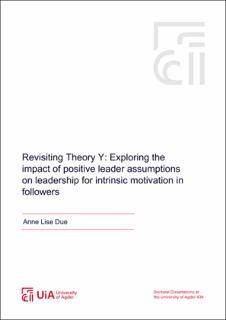Revisiting Theory Y: Exploring the impact of positive leader assumptions on leadership for intrinsic motivation in followers
Doctoral thesis
Published version
Permanent lenke
https://hdl.handle.net/11250/3097203Utgivelsesdato
2023Metadata
Vis full innførselSamlinger
Originalversjon
Due, A. L. (2023). Revisiting Theory Y: Exploring the impact of positive leader assumptions on leadership for intrinsic motivation in followers. [Doctoral dissertation]. University of Agder.Sammendrag
Intrinsic motivation is a powerful but often underutilised resource in today’s workplace. Organisations may therefore miss out on a key contributor to creativity, productivity, and profitability, while employees miss out on a source of meaning, fulfilment, and well-being in their work. Leaders play an important role in influencing employee motivation. Although previous research has produced a wealth of knowledge about how to promote intrinsic motivation, it appears that few leaders fully translate this knowledge into practice. It is therefore timely to revisit McGregor’s (1960/2006) Theory Y, which proposes that having positive assumptions about human nature and human behaviour can influence leaders to engage in practices that promote intrinsic motivation in followers. This study explores the lived experience of twelve Norwegian top leaders to understand how having positive assumptions about human nature and human behaviour can help leaders promote intrinsic motivation in followers. The methodology is interpretative phenomenological analysis. The findings support that the informants have positive assumptions about human nature and human behaviour, and that they translate these assumptions into practice by engaging in an extensive range of practices that promote intrinsic motivation in followers. Additionally, this study identifies a set of mediating personal convictions that help explain whether and to what extent leaders translate their assumptions into practice. This study contributes to understanding of McGregor’s theory in two ways. Firstly, it proposes an intermediate step in the process of translating leader assumptions into leader practices, and identifies five personal convictions involved in this step. Secondly, it proposes a model that further explains the role of these personal convictions in determining whether and to what extent leader assumptions are translated into leader practices that promote intrinsic motivation in followers. The study thereby advances our understanding of the relationship between Theory Y assumptions and Theory Y practices.

